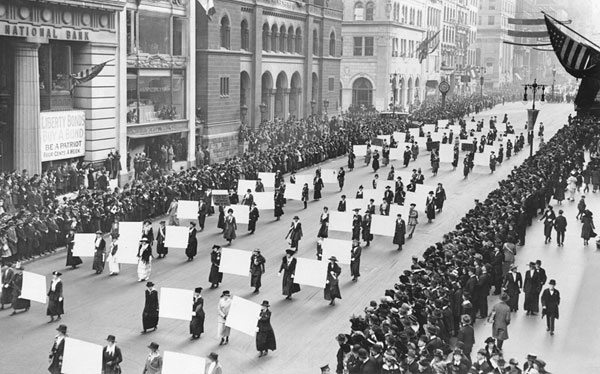
January 26, 2018; The Conversation
Women and girls at the Women’s March to the Polls last month carried many great signs, but one that resonated was carried by a young girl in Wonder Woman regalia. It read: “Voting Is My Super Power.” It brought back memories of the women whose protests and marches of nearly a century ago led to the ratification of the 19th Amendment, giving women full suffrage rights, and laid the groundwork for the continuing work on women’s rights that echoed in the speeches and was evident on the signs at the women’s marches in January 2017 and again last month. The question that remains, now that the marchers have come home is, “What’s next?” How can marchers capitalize on the enthusiasm and momentum?
Since the January 2017 Women’s March, the focus has been on getting women to engage in electoral politics and take seats where they can hold power and make decisions. The numbers speak for themselves. On January 30th, Now This News tweeted:
💪🏽 390 women are running for House seats
💪🏽 50 women are running for the Senate
💪🏽 79 women are considering running for governorships
💪🏽 Thousands more are seeking state and local offices pic.twitter.com/REFVCvHHu1— NowThis (@nowthisnews) January 30, 2018
Today, we are seeing more women at podiums and on the stump. But to move the needle to change the ways our government functions, some lessons can be drawn from the suffragettes. In her article in The Conversation, Liette Gidlow points to three strategies that were central when the 19th Amendment was adopted and the League of Women Voters began as a nonprofit, nonpartisan organization working to promote voting. Those strategies—Communicate, Run, Vote—are at the core of what will be key to the success or failure of the follow-up to the Women’s Marches.
Considering early communication work prior to Twitter, Instagram, Facebook, and other social media, early feminists cleverly captured the market of what was then the modern media: radio, telephones, and glossy print magazines.
Sign up for our free newsletters
Subscribe to NPQ's newsletters to have our top stories delivered directly to your inbox.
By signing up, you agree to our privacy policy and terms of use, and to receive messages from NPQ and our partners.
In 1928, for example, the league partnered with the fledgling NBC radio network to bring its “Citizenship School of the Air” to 15 million listeners. At a time when callers couldn’t dial direct, telephone operators—an overwhelmingly female labor force—reminded election-day callers in 1924 to be sure to vote. Articles and ads in women’s magazines such as the Ladies’ Home Journal nudged millions of its female readers to take advantage of their newfound right to vote.
Today, the communication options are many and varied and can reach different audiences. But reaching them and turning those connections into actual votes on Election Day are not always the same, as the data will show.
As more women are running for office, more enthusiasm will build. Linking that to communications and the “get out the vote” process becomes essential. Voter turnout, especially among women, is key. Gidlow offers advice based on lessons learned by the League of Women Voters in the 1920s:
Based on two decades of research on US history and women’s politics, I believe that today’s female activists can succeed where their foremothers failed.
That is because geography determines who gets to vote for a given candidate. Votes are tallied by precincts, making social media followers from far-flung locations less relevant than they may appear. To translate what looks like overwhelming public support for feminist causes into a winning streak in the 2018 midterm elections, activists must win what political professionals call the “ground game.”
That means organizers will have to identify their potential supporters, precinct by precinct, and register them to vote. They’ll need to communicate with identified supporters repeatedly about shared concerns through traditional and social media channels, direct mail and—above all—in person.
If voting is, indeed, to be women’s superpower, then there is work to be done. And it cannot just be done via social media and the ease of a keyboard relationship. It will take the hard work of organizing and door-to-door outreach and actually ensuring that people get to the polls. It will mean showing up. Being a superhero is never easy. The women who struggled and fought to get us the right to vote were the first superheroes. Are we ready to build on that tradition?—Carole Levine












